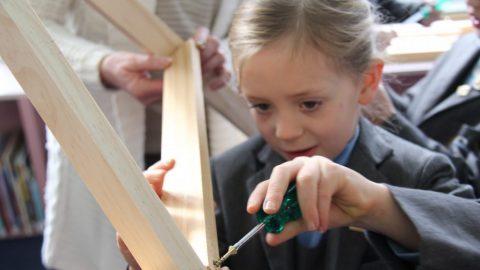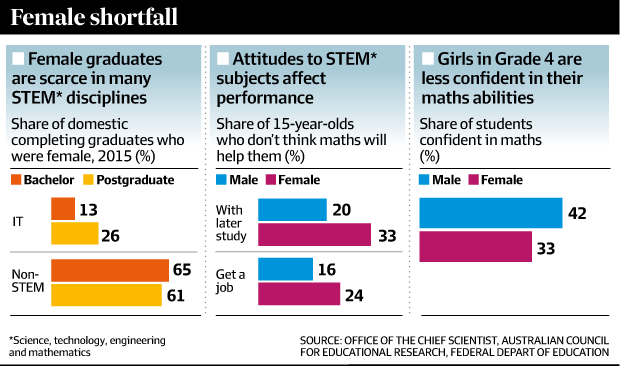From the Principal

The Push to Overcome Barriers to Women Prospering in STEM in the Workplace Needs to Begin at Primary School
At the heart of the design for our new Junior School is the creation of specialist learning spaces that aim to foster the education, growth and creativity in the minds of young St Catherine’s girls. Whilst the subjects of Art, Music and Physical Education are the ‘traditional’ specialist spaces in Junior Schools, it is the inclusion of a STEM Lab in the new development that should excite our families and, importantly, the girls.
During the Junior School Parent Information Evening held last Thursday, I reflected on a study completed in 2016 by the Office of the Chief Scientist – Busting Myths About Women in STEM. The study looked at research and data in the area of women and girls engagement in Science and found “the attrition of female talent from STEM related fields actually commenced in primary school, and continued through to high school, university and the workforce”.

The study highlighted the gender disparity of students’ confidence in Maths in Grade 4 with 42% of boys compared to 33% of girls revealing a significant difference at such young age. Girls were also less likely to accurately assess their ability in STEM related subjects compared to boys, even when they shared the same skill level.
The study suggested the first way to amend this problem was to eliminate bias and stereotyping; this includes exposing girls and boys to female role models at a younger age. Interestingly, research shows that most girls and boys still drew a man when asked to draw a scientist.
According to the report from the Office of the Chief Scientist, the push to overcome barriers to women prospering in science, technology, engineering and maths (STEM) in the workplace needs to begin at primary school. “The key finding is we (Australia) are losing female talent right across the STEM pipeline despite the fact there is no innate difference in ability” (Roslyn Prinsley, co-author of the Report).
This research is supported by an earlier study completed by the Organisation for Economic Co-operation and Development (OECD) in 2015 that revealed despite girls having an overall more positive attitude about school, completed more homework, read more for pleasure and were less likely to play video games, they lacked self-confidence in their ability to, specifically, solve maths and science problems. They also achieved poorer results than boys in these subjects despite out performing boys overall. This study also affirmed research that revealed that girls at ‘all-girls’ schools were more likely to study subjects such as physics and maths at a senior level.
The OECD study revealed less than one in 20 girls considers a career in science, technology, engineering or mathematics (STEM) compared to one in five boys, despite similar performances in the OECD’s PISA science test. This matters because careers in these fields are in high demand and among the most highly paid.
OECD PISA surveys have also shown that girls lack the same self-confidence as boys in science and maths and new analysis reveals striking differences in parental encouragement that exacerbate the problem.
Providing some guidance, The Australian Association of Mathematics Teachers lists the following suggestions for parents and guardians:
- Play games with your daughters from an early age which involve mathematical concepts;
- Exhibit a positive attitude towards mathematics and avoid statements such as “I was never good at Mathematics”;
- Encourage daughters to continue further studies in mathematics;
- Be in regular contact with your daughters’ mathematics teachers;
- Show how mathematics is used in everyday life;
- Encourage your daughters to attend mathematical events such as games days, other competitions and mathematics lectures.
I emphasised during my Address to our parents last Thursday of the importance of avoiding the phrase “I was never good at Mathematics” in the family home. I went as far to say, “I am prohibiting the phrase from St Catherine’s households!” As suggested by well-known Professor Carol Dweck, introducing the word ‘yet’ into the family dialogue also acknowledges the process over the outcome – for example, “I am not good at Maths, yet”. Thus, praising effort over intelligence will always keep girls persevering with the areas they find difficult.
Following the second round tertiary offers to our 2016 graduates last week, I was delighted to see just under 30% of the cohort had accepted places in STEM related courses. This includes courses such as Biomedicine at the University of Melbourne, Engineering at Swinburne, Monash and UNSW and Science at Monash and University of Melbourne. With the addition of the Science Lab and recruiting science specialist teachers in the new Junior School, we hope to inspire and equip students from a young age with the confidence and capacity to continue this trend for St Catherine’s girls to aspire to careers in the science industry.
References
www.oecd.org/education/early-gender-gaps-drive-career-choices-and-employment-opportunities.htm


